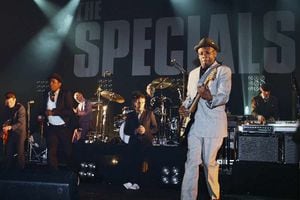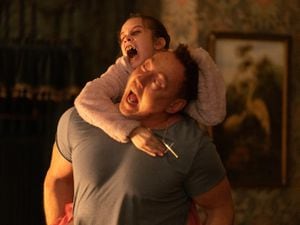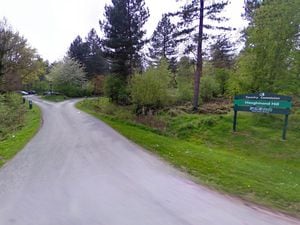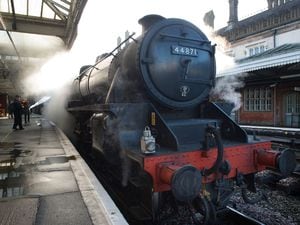Charting the chequered history of 2 Tone legends The Specials
The Specials' Horace Panter remembers the band's rise and fall. Andy Richardson spoke to him.

By the time they'd reached their Everest, the game was already up. The Specials spent three weeks in the sun when Ghost Town, their commentary on inner city deprivation and racial tension, hit number one in the chart.
It was the summer of 1981 and Britain was burning. Disaffected youths had taken to the streets to hurl petrol bombs on the streets of Handsworth, Brixton, Toxteth and Chapeltown to battle with police. Coventry band The Specials were the spokesmen for that generation.
Their song became an anthem for millions and it should have been their greatest hour. They'd spent four years reaching their own personal zenith; they were the acme of pop culture. But, in fact, the tensions on the streets of Britain were mirrored by the tensions within the band.
The Specials, a multi-ethnic, multi-class band, were falling apart.
Their guitarist, Horace Panter – or, as he's known to friends, Sir Horace Gentleman – remembers those dark days: "When the riots came, it was very scary. They were happening at the exact same time that Ghost Town was number one.
"Ghost Town was the theme to civil unrest. It felt very spooky indeed."
The band were thrilled, of course, that their song had captured the zeitgeist. That moment in time had been perfectly encapsulated by a three-minute pop song. And yet, for the band themselves, it marked the beginning of the end. It was the last days of Rome.
"It was the theme tune to civil unrest and we were thrilled to be at number one. The song rocketed from number 15 to number one, which was unheard of at the time," Panter says.
"When it had been released, nobody gave it much of a chance. Melody Maker didn't think it was very good and Sounds didn't get it. But then something extraordinary happened. The song was out of control. It was the only time in pop history that a socially relevant song had got to number one, with the possible exception of God Save The Queen, and people were on the streets. The things we sang about were actually happening.
"That song will be on our tombstones. It was frightening that we'd been able to predict it. It's like if somebody had come along on the 8th of September 2001 and said, 'you know what's going to happen in New York City tomorrow' – and they'd got it right. It was spooky."
However success ultimately led to the Specials calling it a day.
Panter says: "I think we suffered from the same thing that mountaineers suffer from. A lot of them get really depressed after climbing Everest, it was the same with us. After Ghost Town, we had nowhere left to go."
The Specials, however, remain one of Britain's most iconic bands. Their seminal self-titled debut album, was a snapshot of Britain at the dawn of the 1980s. It featured A Message To You, Rudy; Do The Dog; Too Much Too Young, Nite Klub and Concrete Jungle.
Like The Jam and The Sex Pistols before them, or The Smiths, The Stone Roses and Oasis afterwards; they were the most important band in Britain. They were credible, self-assured and soundtracked the lives of people growing up in those times. They were cartographers of the social landscape, the ferment of social unrest was catalogued in their lyrics. "It was exciting times," says Panter. "We did America, Japan and Europe and we had great fun. But after the first album, things unravelled.
"By the time we hit America in 1981, things had got ugly.
"It wasn't good. People weren't talking. It was horrible on stage. In the end, we realised we had to knock it on the head. It was a tough decision to make. We had to step back and say goodbye to fame and kudos and a career. We were in a position where other people had been responsible for our success – and suddenly we had to be responsible for ourselves."
The band went their separate ways. Ambitions to become top dogs were replaced by more humble aspirations: to pay the rent and make a living. The Specials had to rejoin the human race.
"It was pretty grim afterwards but I'd recently got married and my wife had opened a clothes shop. So I went into the rag trade for a year, that was my decompression time."
A version of The Specials reformed in 1993 but it wasn't until 2008 that they got together again on stage. Panter says: "We put a load of dates together and they sold out in the first hour. It was like 'Uh, wow'."
The band decided not to record new songs: but, with a back catalogue as good as theirs', what would be the point?
They love their enduring success. "We have the people who were there in the 1980s and their kids.
"But I tell you what's funny. Back in the day, we were the anti-establishment.
"But now, we've become the establishment. When they wanted to close the Olympics, they didn't turn to Sir Elton, Sir Paul, or Eric. They turned to us, New Order and Blur."
Establishment or anti-establishments. Dinosaurs or anti-dinosaurs. It matters not.
It may be a full 22 years since The Specials were the biggest band in Britain.
But they remain as important, cool, credible and socially relevant today as they did in the summer of 1981.
The Specials headline the O2 Academy in Birmingham on May 21 (sold out) and May 22.





